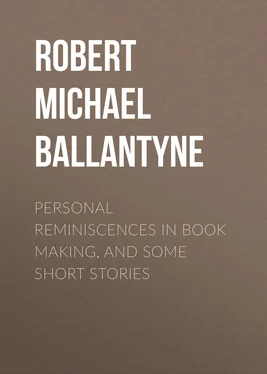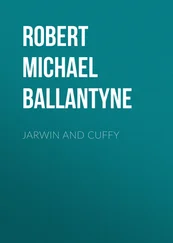Robert Michael Ballantyne - Personal Reminiscences in Book Making, and Some Short Stories
Здесь есть возможность читать онлайн «Robert Michael Ballantyne - Personal Reminiscences in Book Making, and Some Short Stories» — ознакомительный отрывок электронной книги совершенно бесплатно, а после прочтения отрывка купить полную версию. В некоторых случаях можно слушать аудио, скачать через торрент в формате fb2 и присутствует краткое содержание. Жанр: foreign_prose, literature_19, foreign_antique, на английском языке. Описание произведения, (предисловие) а так же отзывы посетителей доступны на портале библиотеки ЛибКат.
- Название:Personal Reminiscences in Book Making, and Some Short Stories
- Автор:
- Жанр:
- Год:неизвестен
- ISBN:нет данных
- Рейтинг книги:4 / 5. Голосов: 1
-
Избранное:Добавить в избранное
- Отзывы:
-
Ваша оценка:
- 80
- 1
- 2
- 3
- 4
- 5
Personal Reminiscences in Book Making, and Some Short Stories: краткое содержание, описание и аннотация
Предлагаем к чтению аннотацию, описание, краткое содержание или предисловие (зависит от того, что написал сам автор книги «Personal Reminiscences in Book Making, and Some Short Stories»). Если вы не нашли необходимую информацию о книге — напишите в комментариях, мы постараемся отыскать её.
Personal Reminiscences in Book Making, and Some Short Stories — читать онлайн ознакомительный отрывок
Ниже представлен текст книги, разбитый по страницам. Система сохранения места последней прочитанной страницы, позволяет с удобством читать онлайн бесплатно книгу «Personal Reminiscences in Book Making, and Some Short Stories», без необходимости каждый раз заново искать на чём Вы остановились. Поставьте закладку, и сможете в любой момент перейти на страницу, на которой закончили чтение.
Интервал:
Закладка:
This storm delayed the “Relief boat” a day. Next day, however, it succeeded in getting alongside—and at length, after a most agreeable and interesting sojourn of two weeks, I parted from the hospitable keepers with sincere regret and bade adieu to a lighthouse which is not only a monument of engineering skill, but a source of safety to the shipping, and of confidence to the mariners frequenting these waters.
In former days men shunned the dreaded neighbourhood of the Inch Cape Rock with anxious care. Now, they look out for that:—
“Ruddy gem of changeful light
Bound on the dusky brow of night,—”
And make for it with perfect safety. In time past human lives, and noble ships, and costly merchandise were lost on the Bell Rock every year. Now, disaster to shipping there is not even dreamed of; and one of the most notable proofs of the value of the lighthouse, (and, indirectly, of all other lighthouses), lies in the fact, that not a single wreck has occurred on the Bell Rock since that auspicious evening in 1811 when the sturdy pillar opened its eyes for the first time, and threw its bright beams far and wide over the North Sea.
Chapter Three
Nights with the Fire Brigade
There are few lives, we should think, more trying or more full of curious adventure and thrilling incident than that of a London fireman.
He must always be on the alert. No hour of the day or night can he ever count on as being his own, unless on those occasions when he obtains leave of absence, which I suppose are not frequent. If he does not absolutely sleep in his clothes, he sleeps beside them—arranged in such a way that he can jump into them at a moment’s notice.
When the summons comes there must be no preliminary yawning; no soft transition from the land of dreams to the world of reality. He jumps into his boots which stand invitingly ready, pulls on his trousers, buttons his braces while descending to the street, and must be brass-helmeted on the engine and away like a fiery dragon-gone-mad within three minutes of “the call,” or thereabouts, if he is to escape a fine.
Moreover, the London fireman must be prepared to face death at any moment. When the call comes he never knows whether he is turning out to something not much more serious than “a chimney,” or to one of those devastating conflagrations on the river-side in which many thousand pounds worth of property are swept away, and his life may go along with them. Far more frequently than the soldier or sailor is he liable to be ordered on a duty which shall turn out to be a forlorn hope, and not less pluckily does he obey.
There is no respite for him. The field which the London Brigade covers is so vast that the liability to be sent into action is continuous—chiefly, of course, at night. At one moment he may be calmly polishing up the “brasses” of his engine, or skylarking with his comrades, or sedately reading a book, or snoozing in bed, and the next he may be battling fiercely with the flames. Unlike the lifeboat heroes, who may sleep when the world of waters is calm, he must be ever on the watch; for his enemy is a lurking foe—like the Red Indian who pounces on you when you least expect him, and does not utter his warwhoop until he deems his victory secure. The little spark smoulders while the fireman on guard, booted and belted, keeps watch at his station. It creeps while he waits, and not until its energies have gained considerable force does it burst forth with a grand roar and bid him fierce defiance.
Even when conquered in one quarter it often leaps up in another, so that the fireman sometimes returns from the field twice or thrice in the same night to find that the enemy is in force elsewhere and that the fight must be resumed.
In the spring of 1867 I went to London to gather material for my book Fighting the Flames , and was kindly permitted by Captain Shaw—then Chief of the Fire Brigade—to spend a couple of weeks at one of the principal west-end stations, and accompany the men to fires.
My first experience was somewhat stirring.
My plan was to go to the station late in the evening and remain up all night with the men on guard waiting for fires.
One day, in the afternoon, when it was growing dusk, and before I had made my first visit to the station, a broad-shouldered jovial-looking fellow in blue coat, belted, and with a sailor’s cap, called on me and asked if I should like to “see a ’ouse as ’ad bin blowed up with gas.”
Of course I was only too glad to follow him. He conducted me to an elegant mansion in Bayswater, and chatted pleasantly as we went along in somewhat nautical tones, for he had been a man-of-war’s man. His name was Flaxmore.
I may remark here that the men of the London brigade were, and still are, I believe, chosen from among seamen.
“You see, sir,” said Flaxmore, in explanation of this fact, “sailors are found to be most suitable for the brigade because they’re accustomed to strict discipline,—to turn out suddenly at all hours, in all weathers, and to climbing in dangerous circumstances.”
Arrived at the mansion, we found that the outside looked all right except that most of the windows were broken. The interior, however, presented a sad and curious appearance. The house had been recently done up in the most expensive style, and its gilded cornices, painted pilasters and other ornaments, with the lath and plaster of walls and ceilings had been blown into the rooms in dire confusion.
“Bin a pretty considerable smash here, sir,” said Flaxmore, with a genial smile on his broad countenance. I admitted the fact, and asked how it happened.
“Well, sir, you see,” said he, “there was an ’orrid smell of gas in the ’ouse, an’ the missus she sent for a gas man to find out where it was, and, would you believe it , sir, they went to look for it with a candle ! Sure enough they found it too, in a small cupboard. The gas had been escapin’, it had, but couldn’t git out o’ that there cupboard, ’cause the door was a tight fit, so it had made its way all over the ’ouse between the lath and plaster and the walls. As soon as ever it caught light, sir, it blowed the whole place into smash—as you see. It blowed the gas man flat on his back; (an’ sarved him right!) it blowed the missus through the doorway, an’ it blowed the cook—(as was on the landin’ outside)—right down the kitchen stairs, it did;—but there was none of ’em much hurt, sir, they wasn’t, beyond a bruise or two!”
After examining this house, Flaxmore proposed that I should go and see his engine. He was proud of his engine, evidently, and spoke of it as a man might speak of his wife!
On our way to the station the driver of a passing ’bus called out—
“Fireman, there’s a fire in New Bond Street.”
One word Flaxmore exchanged with the driver, and then, turning to me, said, “Come on, sir, I’ll give you a ride!”
Off we went at a run, and burst into the station. “Get her out, Jim,” cried Flaxmore, ( her being the engine). Jim, the man on duty, put on his helmet without saying a word, and hauled out the fire-engine, while a comrade ran for the horses, and another called up the men. In five minutes more I was seated beside seven men in blue uniforms and brass helmets, dashing through the streets of London at full gallop!
Now, those who have never seen a London fire-engine go to a fire have no conception of what it is—much less have they any conception of what it is to ride on the engine! To those accustomed to it, no doubt, it may be tame enough—I cannot tell; but to those who mount an engine for the first time and dash through the crowded thoroughfares at a wild tearing gallop; it is probably the most exciting drive conceivable. It beats steeplechasing! It feels like driving to destruction—so desperate and reckless is it. And yet, it is not reckless in the strict sense of that word; for there is a stern need-be in the case. Every moment, (not to mention minutes or hours), is of the utmost importance in the progress of a fire, for when it gets the mastery and bursts into flames it flashes to its work, and completes it quickly. At such times one moment wasted may involve the loss of thousands of pounds, ay, and of human lives also. This is well-known to those whose profession it is to fight the flames. Hence the union of apparent mad desperation, with cool, quiet self-possession in their proceedings. When firemen can work in silence they do so. No unnecessary word is uttered, no voice is needlessly raised; but, when occasion requires it, their course is a tumultuous rush, amid a storm of shouting and gesticulation!
Читать дальшеИнтервал:
Закладка:
Похожие книги на «Personal Reminiscences in Book Making, and Some Short Stories»
Представляем Вашему вниманию похожие книги на «Personal Reminiscences in Book Making, and Some Short Stories» списком для выбора. Мы отобрали схожую по названию и смыслу литературу в надежде предоставить читателям больше вариантов отыскать новые, интересные, ещё непрочитанные произведения.
Обсуждение, отзывы о книге «Personal Reminiscences in Book Making, and Some Short Stories» и просто собственные мнения читателей. Оставьте ваши комментарии, напишите, что Вы думаете о произведении, его смысле или главных героях. Укажите что конкретно понравилось, а что нет, и почему Вы так считаете.












